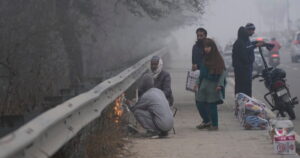Q&A: LGBTQ+ Rights & Environmental Justice With Activist Aurélien Guilabert

A pride parade in the streets of Mexico City. The country has some of the world’s highest rates of violence against both LGBTQ+ people and environmental defenders (Image: Mariana Gutierrez / Alamy)
June is the month where LGBTQ+ pride is celebrated globally. It is a moment of recognition, visibility, and continued fight for equality. But this year, in many parts of the world, pride marches and events come against the backdrop of record temperatures, devastating floods, and grim scientific warnings. In the midst of increasingly urgent climate challenges, many are highlighting the intersections between the climate crisis and the struggles faced by LGBTQ+ movements. Can we find lessons and solidarity in this convergence?
Renowned Colombian transgender biologist Brigitte Baptiste has spoken about palm tree species that change their sex for survival, and frogs that “seem to be in a gay pride parade at all times”, having evolved with a diversity of colours and shapes that has helped them adapt and survive. Elsewhere, forms of family organisation between individuals of the same sex have been observed in the animal kingdom, with some species seeking diverse groupings to defend themselves against adversity.
“There is nothing more queer than nature,” Baptiste has stated.
Though such natural diversity is widely cherished, for LGBTQ+ people in Latin America it is so often a harsher reality, facing alarming rates of violence and mortality. Between 2014 and 2020, at least 3,514 LGBTQ+ people were murdered in Latin America and the Caribbean. These are struggles that share parallels with those of environmental activists, who often risk their lives in defence of the planet. Between 2012 and 2022, more than 1,300 environmental defenders were killed in the region, making it the deadliest in the world for such activities.
Dialogue Earth spoke with Aurélien Guilabert, a Mexico City-based activist committed to both LGBTQ+ rights and environmental protection. Guilabert started the Mexican chapter of Extinction Rebellion, the global movement that aims to compel action on the climate and ecological emergency, has run in local elections for the Mexico City congress, and has worked on HIV prevention and the promotion of gender identity laws in the country. Guilabert explains how his experience of more than a decade on both fronts has revealed strong connections between the defence of human rights and the safeguarding of nature.
Dialogue Earth: How do the LGBTQ+ and environmental defence movements come together today?
Aurélien Guilabert: Today, I see that there are parallels between the movements that are beginning to be woven, but in Mexico the movements work in an atomised way. Even within these same movements there are divisions, unlike in other countries where it has been possible to unite them and generate more transversality. We have been promoting environmental remediation for at least eight years, since I have been on the pride march committee [for Mexico City] – not within the demands of the march as such, but in our actions. For example, we seek to promote that there is no litter during pride marches and that attendees do not buy plastic products. We see more of these actions being put forward, which I find interesting.
What do you think is needed for environmental causes to gain more strength within the LGBTQ+ movement?
One problem is with the government of Mexico City, which has refused to prohibit vehicles [used as floats] during pride parades. What motivates these drivers is money, because people charge you to get into a vehicle, and the position they are given in the parade depends on how much you pay. Paris, for example, no longer has vehicles in the parades, as in many other large cities. We are positioning ourselves to return to the essence of the march on foot, and prevent it being captured by motorists, who represent a patriarchal model, and fossil fuels. At the end of the day, the struggle of both sexual and gender diversity and environmentalism is against the essence of patriarchy, which unites their resistance.
I think that it is also necessary for people to inform themselves and for us as activists to also redefine what the march is. Today, it is a party. I agree that it should be a party, because we must celebrate the progress – we must celebrate our pride, our identities, our orientation – but we must not forget that the march is political in essence. During the first marches, people were taken to prison. Today we have the freedom to march, and that is why people are forgetting the political aspect. I would say that it is essential to recover this political aspect of the march, not forgetting that we also live in the second most violent country for populations of sexual and gender diversity, where we are still killed for our identity or our orientation.
How do LGBTQ+ populations and environmental defenders share vulnerabilities?
The common point is direct violence in Mexico, which is one of the leading countries in murders and violence towards people who defend the land and towards people of sexual and gender diversity. But there is also symbolic violence, that indirect “violence by omission”. It is a violence that we do not talk about: omission is violence, silence is complicity. It is a phrase that we have not tired of saying and that we are going to continue saying. What do I mean when I say that? It is that the government, faced with the exclusion of diverse populations, or the climate crisis, is doing very little or is taking insufficient actions today.
What gives you hope for the future with both movements?
The new generations. Because these two movements, both the climate movement and that of sexual and gender diversity, have already been fully taken on by the new generations today. There is a new paradigm that is growing at a very rapid speed, and they are deconstructing the patriarchal model that has dominated the world and continues to dominate. But there is hope and if today you go with the young people of 12, 13 years old, pre-adolescents and adolescents, the issue of identity does not worry them, the issue of orientation does not worry them, and they already have a climate awareness different from that of generations who today are 40, 50 years old. And that gives me more hope than anything.
(Published under Creative Commons from Dialogue Earth. Read the original article here)





